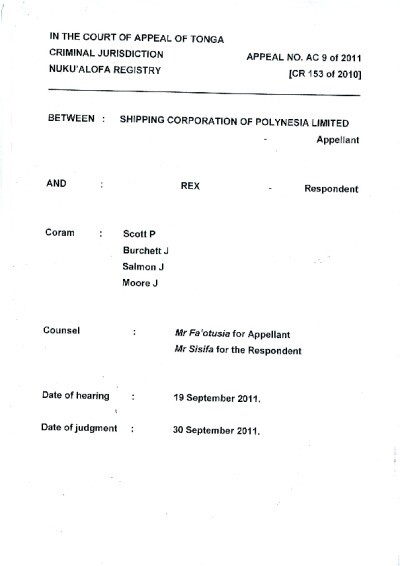
Date
Geographical Area
Pacific
Countries
Tonga
Case Name
Shipping Corporation of Polynesia Ltd v Rex
Case Reference
[2011] TOCA 13
Name of Court
Court of Appeal of Tonga
Key Facts
On 5 August 2009, an inter-islander passenger ferry – the MV Princess Ashika – sank, killing 74 of the 128 people onboard at the time.
The vessel’s owners, the Shipping Corporation of Polynesia Ltd, were charged with manslaughter by negligence and five charges of sending an unseaworthy ship to sea. They were found guilty on all charges. The Court fined the Shipping Corporation T$1 million pa’anga for the manslaughter charge and T$200,000 pa’anga for each of the other five charges, a total of T$2 million pa’anga, which was to be paid to the Polytechnic Institute and to the Women’s Crisis Centre.
The Shipping Corporation appealed these fines. The Court was asked to consider: whether the fines were excessive; whether the judge should have considered the financial position of the company; whether the Court has the power to order fines to be paid to individuals or organisations who are not plaintiffs; whether the Court should have had regard to the economic differences between Tonga and the UK in determining the fines; and whether the fines imposed were unjust.
The vessel’s owners, the Shipping Corporation of Polynesia Ltd, were charged with manslaughter by negligence and five charges of sending an unseaworthy ship to sea. They were found guilty on all charges. The Court fined the Shipping Corporation T$1 million pa’anga for the manslaughter charge and T$200,000 pa’anga for each of the other five charges, a total of T$2 million pa’anga, which was to be paid to the Polytechnic Institute and to the Women’s Crisis Centre.
The Shipping Corporation appealed these fines. The Court was asked to consider: whether the fines were excessive; whether the judge should have considered the financial position of the company; whether the Court has the power to order fines to be paid to individuals or organisations who are not plaintiffs; whether the Court should have had regard to the economic differences between Tonga and the UK in determining the fines; and whether the fines imposed were unjust.
Decision and Reasoning
The Court found that there was no legislation which allowed the Courts to require a portion of a fine to be paid to individuals or organisations other than the plaintiff, which in this case was the Crown. Nor could the Court direct the Crown to allocate a portion of the fines imposed to a particular group. Therefore, this part of the appeal was allowed.
Although the Court found that the financial position of the defendant is a relevant factor which should be taken into account in sentencing, in their view, the consequences of sending an unseaworthy vessel to sea needed to be made clear. The Court agreed with the trial judge that a strong message needed to be sent.
Although the Court noted the differences in economies between the UK and Tonga, they emphasised that the offending was extremely serious and deserved a very significant penalty.
In determining what was an appropriate fine, the Court took into account that the defendant was convicted of a number of charges relating to the same transaction, stating that it was reasonable to treat the total offending as the equivalent of one offence. For this reason, the Court reduced the fines of the five unseaworthiness convictions to a nominal amount.
Although the Court found that the financial position of the defendant is a relevant factor which should be taken into account in sentencing, in their view, the consequences of sending an unseaworthy vessel to sea needed to be made clear. The Court agreed with the trial judge that a strong message needed to be sent.
Although the Court noted the differences in economies between the UK and Tonga, they emphasised that the offending was extremely serious and deserved a very significant penalty.
In determining what was an appropriate fine, the Court took into account that the defendant was convicted of a number of charges relating to the same transaction, stating that it was reasonable to treat the total offending as the equivalent of one offence. For this reason, the Court reduced the fines of the five unseaworthiness convictions to a nominal amount.
Outcome
The Court upheld the fine imposed for manslaughter; however, it reduced the fines of the five charges relating to unseaworthiness to nominal fines of T$100 pa’anga each.
Link
Disclaimer
This case law summary was developed as part of the Disaster Law Database (DISLAW) project, and is not an official record of the case.
Document
Document